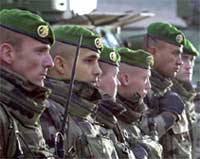NATO launches offensive against Taliban in southern Afghanistan
NATO-led troops launched an offensive against Taliban militants in a volatile southern Afghan province where hundreds of militant fighters have amassed. One NATO soldier was killed during combat operations in the south.

The operation, which will eventually involve 4,500 NATO troops and 1,000 Afghan soldiers, was launched Monday at the request of the Afghan government and will focus on the northern region of Helmand province, Col. Tom Collins, the spokesman for NATO's International Security Assistance Force, said Tuesday.
The offensive "is focused on improving security in areas where Taliban extremists, narco-traffickers and foreign terrorists are currently operating," Collins said. "Once the security situation is improved, we will begin short- and long-term reconstruction projects."
Dubbed Operation Achilles, the offensive is NATO's largest-ever in the country. But it will involve only half the number of soldiers that fought in a U.S. offensive in the same region just nine months ago, when some 11,000 U.S.-led troops attacked fighters in northern Helmand province during Operation Mountain Thrust.
Collins said although international forces were returning to the same region, the situation was "fundamentally different" this year and NATO had a much better opportunity to establish a permanent presence because more troops were in the country.
Some 1,500 U.S. troops will take part in Achilles. British, Canadian, Dutch and Afghan forces are also taking part.
"We cannot allow extremists, criminals and Taliban to decide what happens in this country," Maj. Gen. Ton van Loon, ISAF's southern commander, told reporters. "We need to make sure the government of Afghanistan with our support ... secures the area."
An ISAF statement said one soldier died Tuesday in the south during combat operations, but it gave no further details. Collins said he didn't know if the fallen soldier was involved in the new operation.
The government has little control over many parts of northern Helmand, and the British troops stationed there fight almost-daily battles with militants. U.S. intelligence officials say Taliban fighters have flooded into Helmand the last several months, and there are now more fighters there than any other part of the country.
The militants overran Musa Qala, in northern Helmand province, on Feb. 1 after defying a peace deal between the government and elders reached last fall that capped weeks of fighting. The Taliban still control the town more than a month after the initial attack. Collins said forces would not move into the village until given approval by the government.
British troops have also been battling militants in the nearby district of Kajaki to enable repair work on a hydroelectric damn there, which supplies close to 2 million Afghans with electricity.
"Strategically, our goal is to enable the Afghan government to begin the Kajaki project," van Loon said. "This long-term initiative is a huge undertaking and the eventual rehabilitation of the Kajaki multipurpose dam and power house will improve the water supply for local communities, rehabilitate irrigation systems for farmlands and provide sufficient electrical power for residents, industries and commerce."
Helmand is the world's biggest producer of opium, and a new U.N. drug assessment indicates this year's poppy harvest could be higher than last year's record output. The U.N. says Taliban fighters protect poppy farmers and tax the crop, deriving much-needed income for their insurgency, reports AP.
Meanwhile, a remote-control bomb targeting a police vehicle on Tuesday killed one policeman and wounded another in Murja district, also in Helmand, said Ghulam Nabi Mulakhail, the province's police chief.
The blast also wounded six Afghan civilians nearby, said Abdul Basir, a police officer in the district.
Subscribe to Pravda.Ru Telegram channel, Facebook, RSS!


